Last updated on March 31st, 2024
Featured image: Learn how to navigate the ethics of food and travel and enjoy delicacies around the world | Photo by KostiantynVoitenko on Envato
Adventure, ethics, and sustainability all come into play when deciding what food you will try
by Maureen Littlejohn
For many of us, when traveling, trying new foods is part of the adventure. But sometimes the options are questionable for a variety of reasons. Delicacies in some countries can mean putting pressure on endangered species or encouraging practices that we don’t accept at home, for example slicing off a shark’s fin for soup. Or the animal protein on the menu we do not associate with being a dietary choice. Horse meat is popular in France and other European countries, but not in the United States. Tarantulas are a snack food in Cambodia but people from other countries might shiver at the thought.
How do you figure out what foods are ethically okay to eat? After doing some research, talking to some experts, and examining my own history and heart, I think it boils down to what works for the individual…and doing a bit of research before lifting your fork.
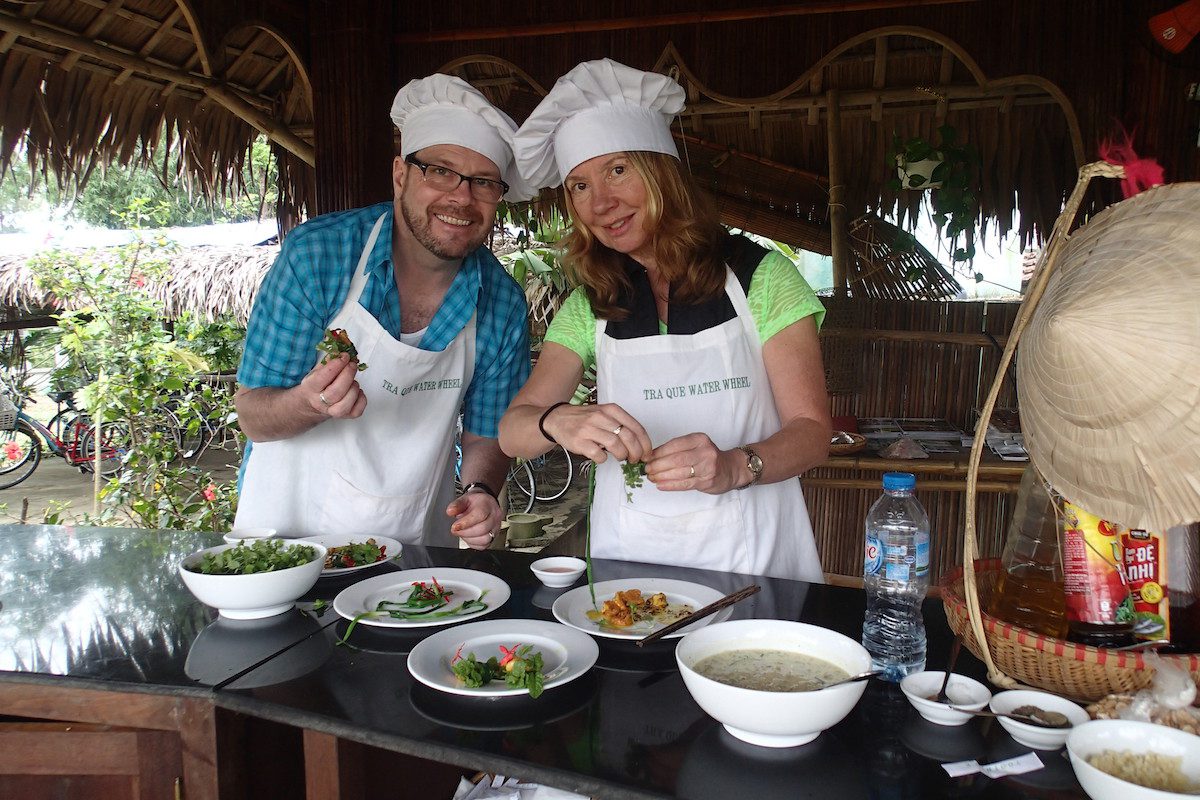
Maureen and Steve attend a cooking class in Hoi An / Photo provided by Maureen Littlejohn
Vegetarians may have an easier time with the ethics of food and travel
Vegetarians such as Chantal Cooke, co-founder of Passion for the Planet, a pioneering, ethically focused radio station based in London, England, sometimes have an easier time deciding.
“For many places eating a lot of meat is a relatively new thing, so sometimes it’s easier to find traditional dishes that are based around vegetables rather than meat. If you aren’t sure, then most people are very happy to help and tell you about their cuisine. And if you look into the area and what they grow locally, that can help you choose too.”
Omnivores might find it a little more tricky
For instance, I have eaten kangaroo in Australia and reindeer in Norway. These were presented at local restaurants and were part of certain regions’ traditional indigenous proteins. When I lived in Vietnam, I saw restaurants that served dog. And in some cases, cat. Although there was a historical context for eating these animals, I have always considered them as pets. For me, eating them was not an option.
“There’s a fine line to walk between personal preferences and culinary heritage,” says Erik Wolf, executive director and founder of the World Food Travel Association, a global authority on food and beverage tourism.
Food and cultural values
In some cultures, it is believed that if you ingest certain animals, you will take on their characteristics. A Vietnamese friend of mine was distressed that her father still insisted on eating dogs although she was against it. “He thinks it makes him strong and virile,” she told me.
I did not see tourists indulging in canine meat, but what I did see in the tourist areas were scorpions and snakes preserved in liquor. Shopkeepers said that a shot of this liquor would make the imbiber fierce. For some of my expat friends who tried it, it was more about being brave enough to take on the dare.
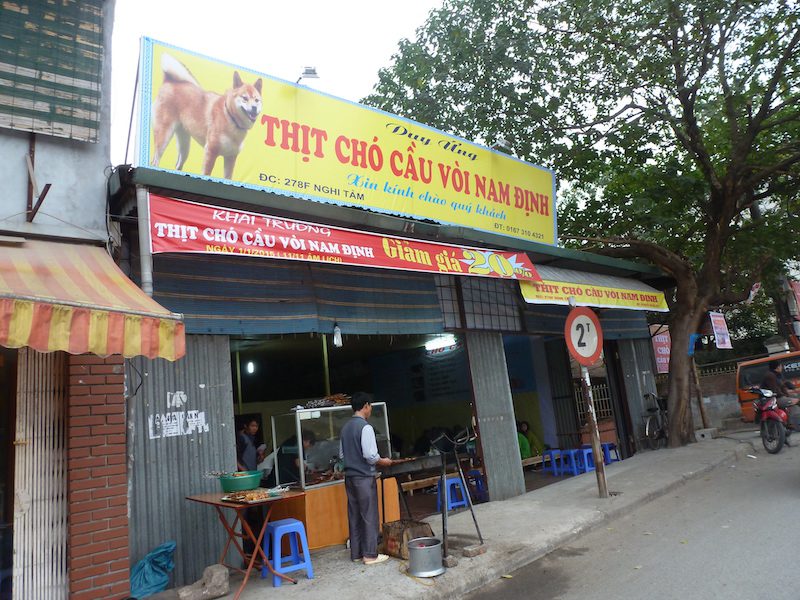
A restaurant in Vietnam advertising dog meat / Photo by Maureen Littlejohn
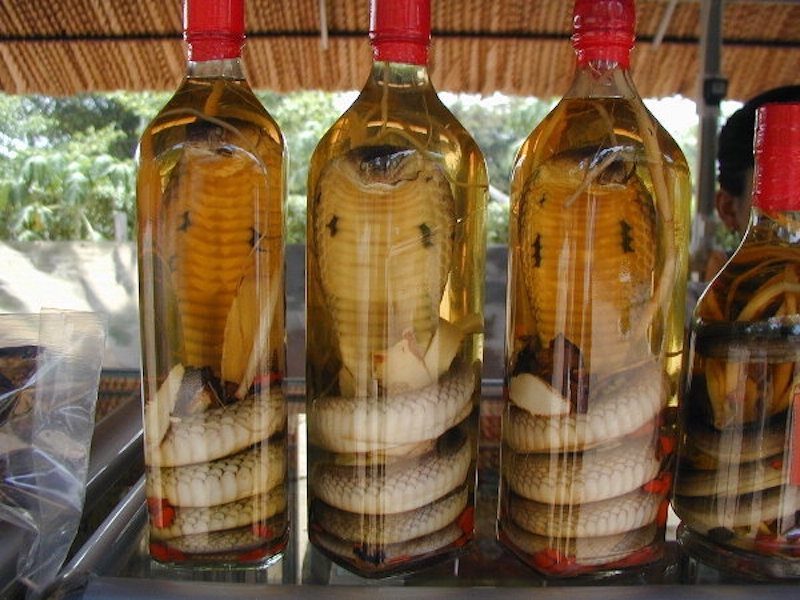
Snakes being preserved in liquor / Photo by Maureen Littlejohn
For some cultures, bugs and insects are part of their diet
Bugs are another squeamish subject for some people. But, travel the world and you will come across cultures that consume insects.
“Insects are just macronutrient sources hidden in plain sight,” says Jonathan DeLise, an American food writer and YouTube producer of @findingfoodfluency who spends much of his time in East Asia and Mexico.
Wolf agrees. “The Indigenous people in Australia and New Zealand eat grubs. For such cultures, it is entirely normal. A tourist can be offered to try such foods but should never make fun of or show disgust at what the locals eat. That would be culturally offensive.”
Sustainability and food choices
Sustainability is another concern when it comes to food choices. Shark fin soup, served by Chinese emperors thousands of years ago, is a status symbol today. Overfishing has caused a severe depletion in their numbers according to the environmental group Shark Stewards. The organization is dedicated to protecting these important predators and working to stop the shark fin trade. However, it is still a prestigious dish and served at high-ranking celebrations in some Asian countries.
“There is a case for sustainability to preserve sharks in our seas to benefit our ecosystems. Cuisines can and in some cases, should, change,” says Wolf.
Iceland recently outlawed whaling, and a long-standing culinary tradition there is changing. In January, South Korea banned the breeding, slaughter, and sale of dog meat for human consumption. While we can be surprised or affronted by what other cultures have on their menus, DeLise notes it is important to do your research. Even in your own backyard.
“I’m amazed to find that an avocado can be bought for as little as US$.99 in New York. That’s an absurdly low price for a fruit that hates cold temperatures, needs copious water to thrive, and is grown thousands of miles away. Reading more about them, I came to learn about the avocado cartels of the Mexican state of Michoacán. Over the past 15 years, avocados have become so popular throughout the West (and increasingly, China) that their trade has become the edible analog for drugs.”
Food plays an important role in travel. Not only does it nourish us, it can open our eyes to cultural heritage and different traditions. How do you know what to eat and what not to eat? Do your homework. Be adventurous, and make choices that are right for you.
Tips for Eating Ethically When Travelling
Here are some pointers for making your menu decisions from two experts. Chantal Cooke, is co-founder of Passion for the Planet, a pioneering, ethically focused radio station in London, England. Erik Wolf is the Executive Director of the World Food Travel Association, an organization that is a global authority on food and beverage tourism.
How can you choose the best option when it comes to local, traditional foods, especially vegetarian or vegan?
Many traditional and/or local dishes are already vegetarian or vegan, in fact for many places eating a lot of meat is a relatively new thing, so sometimes it’s easier to find traditional dishes that are based around vegetables rather than meat. If you aren’t sure then most people are very happy to help and tell you about their cuisine. And if you think about the area and what they grow locally that can help you choose too. – C.C.
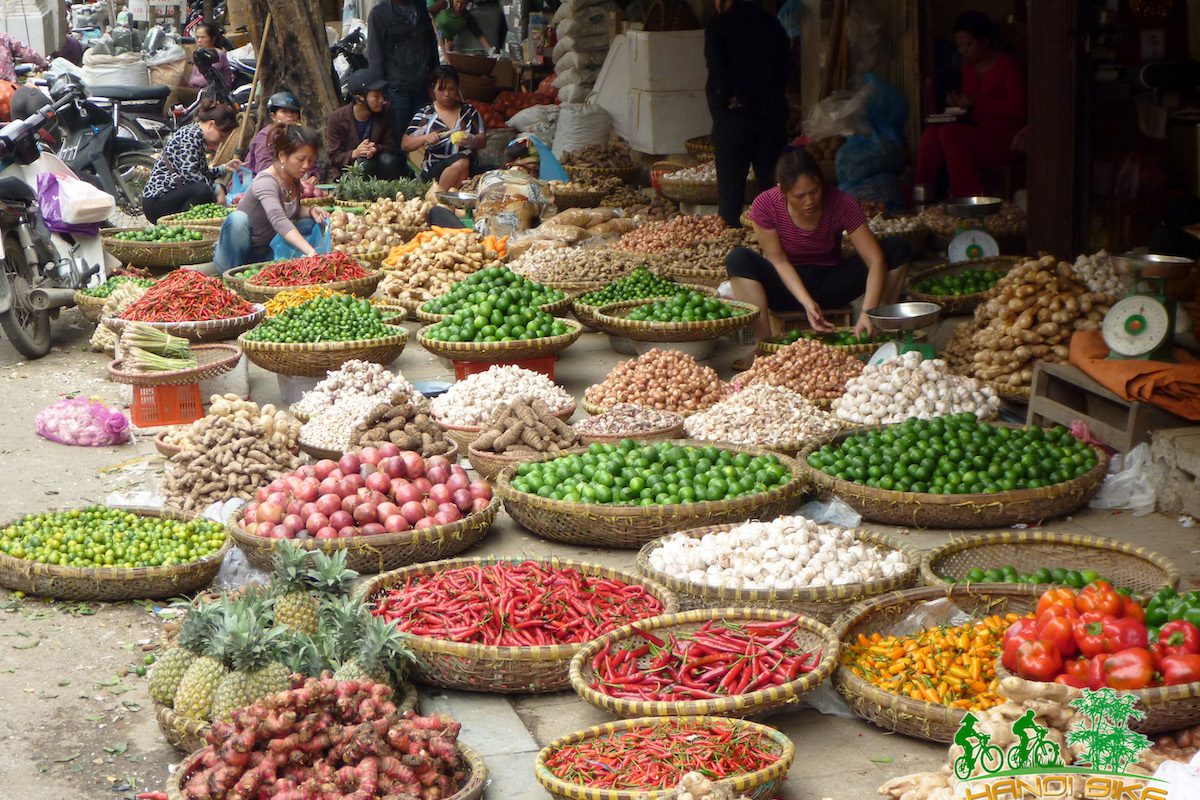
A market with all sorts of produce being sold in Hanoi, Vietnam / Photo by Maureen Littlejohn
Are there ethics involved, i.e., not choosing unsustainable options?
It’s impossible to be perfect. So my rule is just to do the best I can under the circumstances. Different countries are at different stages in the sustainability journey and much as that may be frustrating when you are doing your best to be eco-friendly, it has to be recognised and accepted. For me, I always choose plant-based first.
Anything with animal products, especially meat, will almost always be less sustainable than something with vegetables, even if the vegetables haven’t been grown most sustainably. The difference in environmental impact is so huge you can pretty much always be sure that an imported vegetable will still have a lower impact than locally reared meat. I am not saying there are never exceptions, but as a general rule of thumb, when you can’t dig deeply into the provenance, the growing conditions, the workers’ rights, the transport, and the distribution, for example, so you have to decide on the information in front of you, vegetables are always more sustainable, more environmentally friendly, more ethical and less cruel than meat. Oh yes, and better for your health. – C.C.
When in certain countries, there are dishes that they may try to sell especially to tourists. For instance, I am in Colombia right now and touts try to get people to sign up to eat “big-assed ants.” It seems very much a touristy thing. What is your take on this type of culinary offering?
I am all up for trying new dishes, but not if a living creature has had to die. So for me, ants are a “no.” I also feel many of these things are gimmicks and don’t give you an authentic experience. Travel is about all sorts of experiences, and food is part of it, but not eating ‘big assed ants’ isn’t suddenly going to turn my trip from success into a disaster. – C.C.
Horse meat, guinea pigs, llama, kangaroo, and other creatures are often eaten in certain cultures. How can visitors honour tradition even when they might feel the practice is offensive?
The best way to show respect in situations like these is to politely decline. Do not act shocked or get confrontational. One strategy that might work is to let the host know you are vegetarian or vegan, even if you are not. You could say that you “eat vegetarian now” to be factually correct, even if it is just for that meal. – E.W.
What are some red flags tourists need to be aware of when it comes to local foods and sustainability? For instance, when there is a demand for something a community cannot sustain long term, like eating songbirds in China for example.
Tourists need to know before arrival what foods they might encounter and the environmental cost associated with such items. Do your research. It’s just like being prepared for anything else that is culturally different. Women should be prepared to cover their heads, arms, and legs in Muslim countries. Travelers should not expect they can import illegal drugs into Singapore or Malaysia, or they could be tortured or even executed for the offense, as opposed to just being arrested in many other countries The motto here is, be prepared. – E.W.
How would you describe culinary ethics when it comes to supporting local entrepreneurs? I’m thinking about an entrepreneur for instance who wants to exploit a certain tourism market that might not be best for the local community.
I assume you’re speaking about exploiting unusual or controversial foods (or animals) for profit. This is when the government needs to get involved and regulate the situation for food safety, food health, food hygiene, or environmental reasons.
This is where the UN SDGs can help, where exploiting an insect (or a marine animal) might harm the environment. Iceland just outlawed whaling, so a long-standing culinary tradition is capable of being changed. It is true, that some people may lose their jobs, but new jobs will open up to them. Someone claiming that it is their financial right to make a living this way (i.e. from whaling) needs to be told “No, it is not your right to make a living that way. Times have changed.” Then they need to be shown a better way to make a living. Tell them “no”, but give them a better solution at the same time. – E.W.
Read More on Culinary Travel
Where to Eat in Florence, Italy, From a Culinary Expert
With thousands of restaurants in Florence, culinary tour entrepreneur Coral Sisk shares lesser-known places to enjoy in the off season.
How to Enjoy Dining Alone: 30 Tips from Solo Women Travellers
Solo women share their best tips on how to enjoy eating alone, revel in your own company and embrace the wonder of the moment.
Beer, Chocolate and Fries Anyone? Where and What to Eat in Flanders, Belgium
Discover what to eat in Flanders, Belgium with some of the world’s best beer, chocolate and fries. Dine, slurp and drown in butter, cream and farm-fresh food.

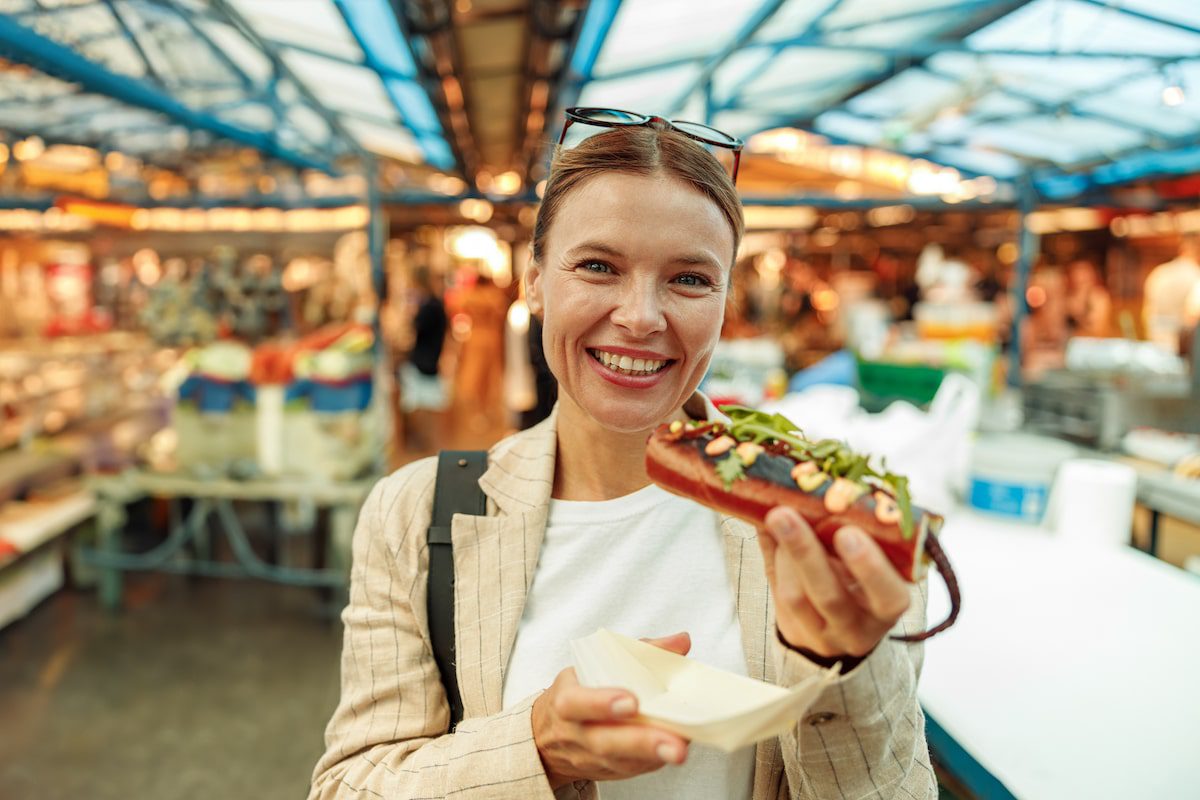






0 Comments
We always strive to use real photos from our own adventures, provided by the guest writer or from our personal travels. However, in some cases, due to photo quality, we must use stock photography. If you have any questions about the photography please let us know.
Disclaimer: We are so happy that you are checking out this page right now! We only recommend things that are suggested by our community, or through our own experience, that we believe will be helpful and practical for you. Some of our pages contain links, which means we’re part of an affiliate program for the product being mentioned. Should you decide to purchase a product using a link from on our site, JourneyWoman may earn a small commission from the retailer, which helps us maintain our beautiful website. JourneyWoman is an Amazon Associate and earns from qualifying purchases. Thank you!
We want to hear what you think about this article, and we welcome any updates or changes to improve it. You can comment below, or send an email to us at [email protected].